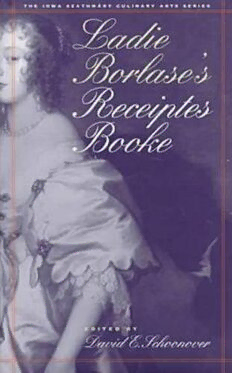
Ladie Borlase's receiptes booke PDF
01998·1.171 MB·English
Most books are stored in the elastic cloud where traffic is expensive. For this reason, we have a limit on daily download.
Preview Ladie Borlase's receiptes booke
Description:
Ladie Borlase's Receiptes Booke, an English manorial and culinary manuscript, has been in existence for at least 333 years. This manuscript, bearing dates from 1665 to 1822, provides a unique compendium of culinary history that opens a window to the aristocratic, social, agricultural, horticultural, economic, and medicinal aspects of English country life. The Borlase manuscript is a kind of miscellany. Included are recipes not only for all kinds of foods but also for distilled waters, remedies, dyes, soaps, and perfumes. A housewife of that period was responsible for keeping her family healthy and her house clean and sweet smelling, and so the manuscript features directions for preparing medicinal "oyles," waters, "glysters," powders, "ballsoms," a "true Majistery," and a julep, with healing powers for a number of ailments from apoplexy and gout to cancer and the plague. The cookery recipes concentrate almost entirely on sweets and meats with only a few mentions of vegetables. More than half of the recipes included in this manuscript are for sweets. This was important as sugar was entering Britain in greater quantities and because people believed in sugar's supposed health benets. Several recipes for preserved fruits reect a changing diet and appetite among the British as the availability of fruits and vegetables increased in both quantity and variety. David Schoonover's informative introduction places the Borlase manuscript in its historical context with special attention to the economic and social changes of the sixteenth and seventeenth centuries, which brought about a new emphasis on housewifery and the management of households. He also provides a brief summary of the Borlase family history--born in 1621, Alice Bankes, Lady Borlase, died in 1683 at the age of sixty-two years--and a description of their home at Bockmer Manor at Medmenham, Buckinghamshire.
See more
The list of books you might like
Most books are stored in the elastic cloud where traffic is expensive. For this reason, we have a limit on daily download.
